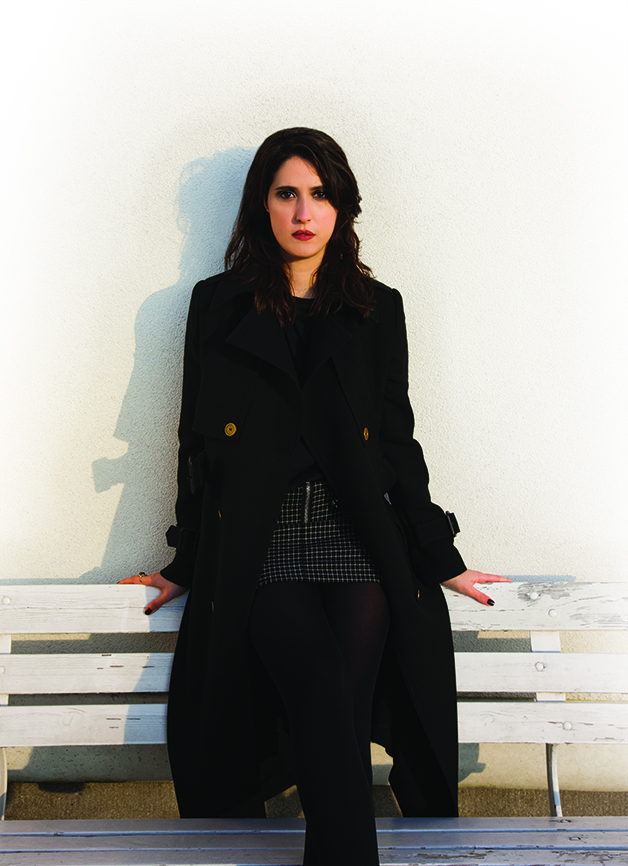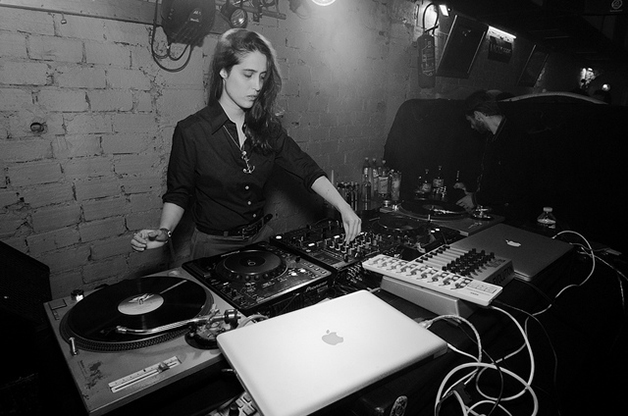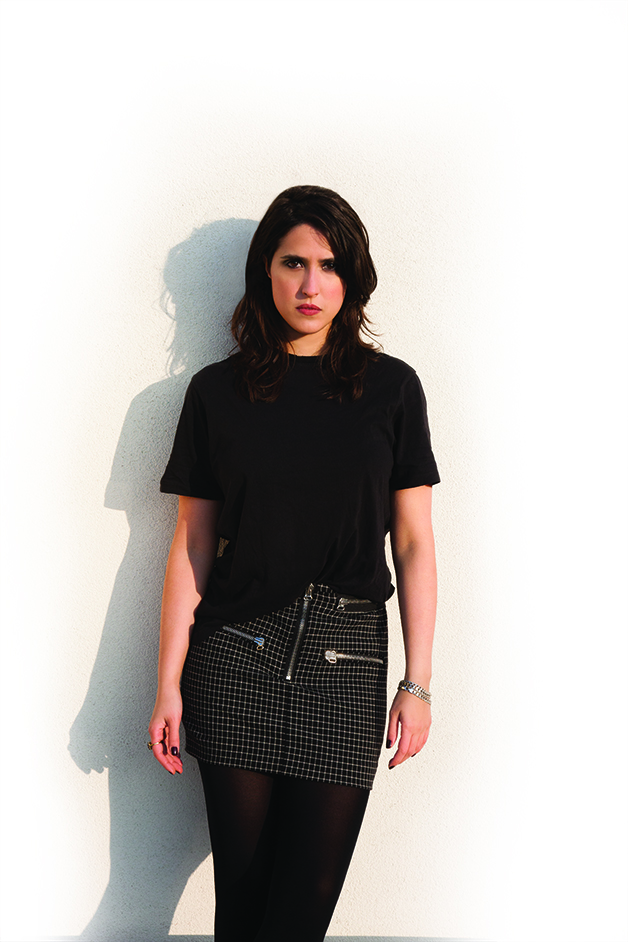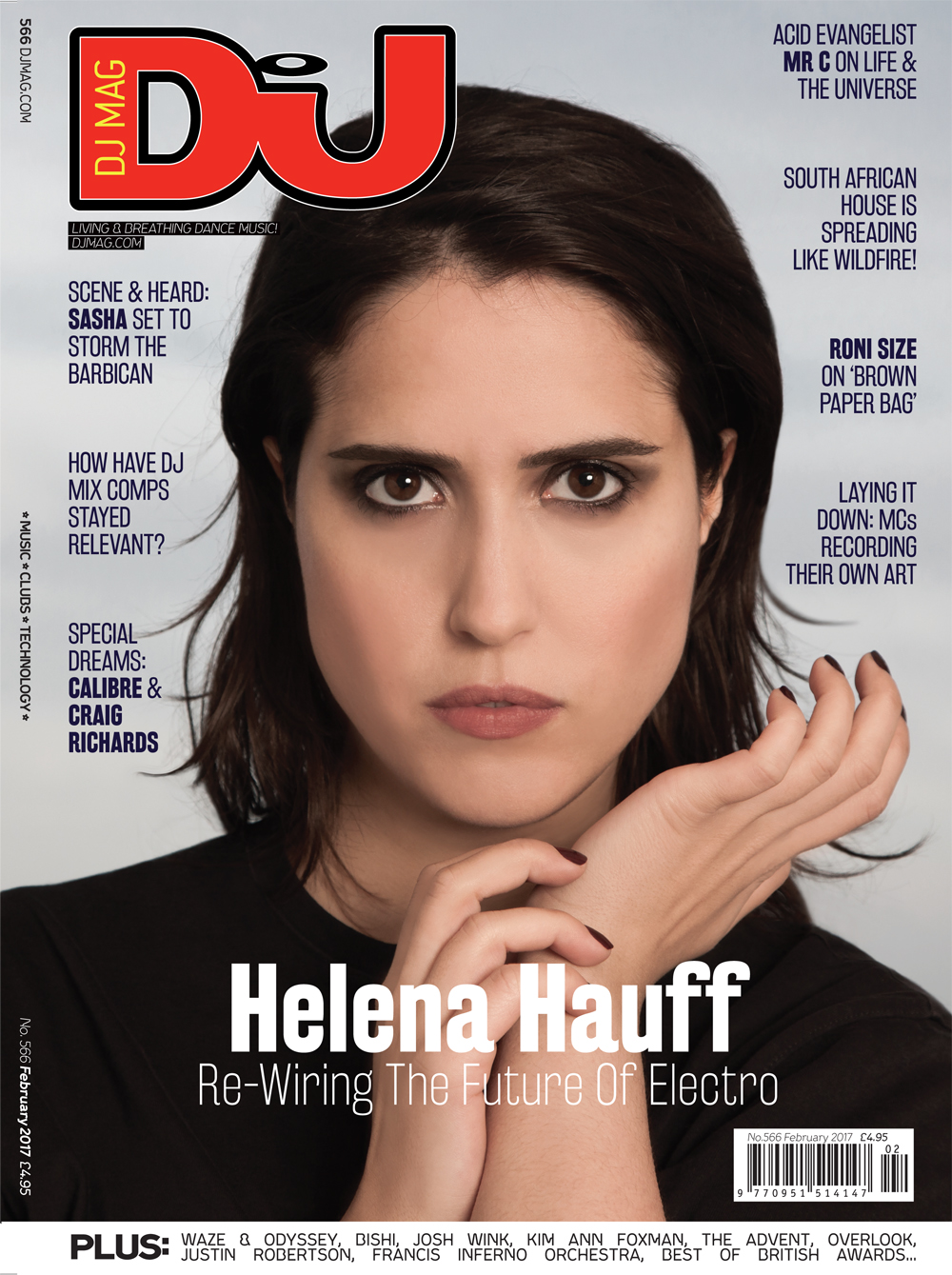German techno DJ/producer Helena Hauff is riding the crest of a wave right now. An analogue freak signed to Ninja Tune-affiliate label Werkdiscs — the label overseen by Actress — she’s just been snapped up by BBC Radio 1 for a residency, and has been rocking floors all over with her killer vinyl-only DJ sets. DJ Mag travels to Essen in Germany to one of her extended gigs to talk analogue kit, acid classics and what to do if your studio catches on fire...
Words: Charlotte Lucy Cijffers
Pics: Tanya Chalkin / Live Pic: Madeline Penfold
___________
Helena Hauff is one of a kind. Part musician, part mad scientist, she’s a vinyl addict and a turntable maverick, but she almost lost it all when her apartment building burned down. She only makes music on 30-year-old machines and she says she finds computers “uninspiring and distracting”. She doesn’t own a credit card, she actively avoids smartphones and she’s not on Facebook — like we said, she’s one of a kind.
Born and raised in Germany’s second largest city, Hamburg, Hauff’s journey from bedroom tinkerer to techno’s A-list has been convoluted — she’s tried her hand as a fine artist and a physicist too. After both fell through, she’s pursued a life as a DJ/producer solidly and successfully for the best part of a decade, touring at weekends and returning home to jam-out in a haven of twisted wires and discontinued drum machines during the week.
Her studio has one foot in the past, but her music — rough, acerbic, unapologetic — sounds like it’s come from a dark and dystopian future. Her DJ sets are just as dynamic; expect ‘90s acid anthems mixed with post-punk off-cuts and noisy EBM when Helena’s at the helm. Her skills as a selector haven’t gone unnoticed — she’s just been locked down as one of BBC Radio 1’s 2017 residents. It’s the checkmate move in her slowly bubbling career, an invitation for fans globally to enter the darkly weird and wonderful world of Helena Hauff.
WERK IT
DJing and dabbling in production for the last eight years, Helena Hauff is far from an overnight success. She’s gradually gained recognition thanks to her intoxicating DJ sets, alongside a smattering of hard-hitting productions and her close relationship with UK independent label, Ninja Tune. It’s on the imprint’s rougher, less-accessible partner label, Werkdiscs, that Hauff has really found her niche, releasing her first full-length, ‘Discreet Desires’, in September 2015.
It was the perfect snapshot of what Hauff is all about: ten tracks of acidic, machine-made techno without a computer programme in sight. There were flecks of electro, post-punk and EBM in there too, alongside subtle moments of misty-eyed musicianship and the occasional slamming ‘80s synth solo. Most importantly, it put Hauff in front of the right people, bulking up her international bookings and pushing her sound further outside German borders. “It definitely opened a door for me, that release,” says Helena.
Started in 2004 by UK DJ/producer Actress (real name: Darren J. Cunningham) in the early noughties, Hauff’s sound slotted nicely into the Werkdiscs motif. The imprint had already housed Actress’s own productions, alongside those of label alumni Zomby and Disrupt, plus UK wunderkind Lone. “I’ve always loved Actress’s music and I was quite surprised that he liked mine too, to be honest,” Hauff says, modestly. “He played in Hamburg and I played support for him. It was organised by this guy called f#x — he’s the guy I used to do Black Sites with. That was a side project that we did and we released on Pan. Anyway, one year after I played with Actress he got in touch with me and said, ‘Hey, do you want to play my album release party in London at Plastic People?’. And that’s how it all started really.”
The result of that meeting was Hauff’s first record for Werkdiscs, ‘Actio Reactio’, which dropped in late 2013. A rough-and-ready minimal 12-inch that was far sparser than anything on ‘Discreet Desires’, it celebrated her love of minimal wave and paved a way for releases for labels like Lux Rec, Panzerkreuz and Solar One Music. Since then there’s little doubt that Hauff’s sound has matured, her work denser and more considered than when she first started, but she’s never lost her signature acidic twist.
“I was always into rougher, raw-sounding stuff,” she says, emphatically. “I guess I was never into that cleaner-sounding music, I never really like that really happy-sounding music.”

ACID ON THE RADIO
Fast forward to 2017 and Hauff has already chalked up bookings at Dekmantel’s Sao Paulo edition, Sonar in Iceland and an all-nighter at Brixton-based club, Phonox. But it’s in none of these places where DJ Mag manages to pin her down — instead it’s the industrial German city of Essen where DJ Mag finally meets her.
“Sorry, you’ve had to come to one of Germany’s least exciting cities to meet me,” she jokes. She’s got a point — Essen doesn’t seem like a city flush with techno sensibility. If anything, it feels sleepy and deserted — the streets are eerily silent by 10pm as we walk briskly to meet her on a frigid December evening. She’s been booked to spin for a whopping five hours tonight at the slightly bizarrely-titled nightclub, GoeTheBunker — a dimly-lit rave cave in Essen’s back blocks.
DJ Mag is partly here thanks to Helena’s newly-announced BBC Radio 1 Residency, a move that’s set to propel her to full-scale techno ubiquity. And it’s about time. Although she’s been on our radar for over four years, this is the move that’s made her ripe for UK cover stardom. It’s yet to be seen how Hauff’s neck-snapping signature club sets will translate into a radio format, but it seems like a perfectly-timed challenge for the on-the-rise German selector.
“Well, I think I’m going to treat it like a radio show,” she says, matter-of-factly. “I mean, I know that sounds obvious, but I don’t think I’m going to have one hour of straight beats all the way through, then a talking show as well — I want to play actual songs. With talking in-between, obviously. It’s going to be mostly electronic music, although I might play something unexpected too — but only if I feel like, ‘Yes, right now I really need this record!’. And it’s going to be more or less techno. I really want to showcase all the different styles within that — all the different parts of the genre that I like. I want it to be very diverse,” she concludes.
As a DJ, Helena plays as rough-and-ready as the music she makes, but she’s not interested in trying to be a musical educator. “I don’t think we educated people. I certainly don't want to be a teacher. I don’t like that word at all. But I feel like it’s great to share music with people.”
As DJ Mag heads to watch her set later that evening at GoeTheBunker, we’re not entirely sure what to expect — but that’s all part of Helena Hauff's appeal. John Acquaviva and Texas Audio’s ‘Assassin’ is slamming from the stacks as DJ Mag enters, whilst we weave our way past a pile of broken TVs and a graffiti-covered bar. The crowd inside is a typical mix of techno freaks and fresh-faced club kids — DJ Mag watches transfixed as a young couple thrash arm-in-arm at front of the heaving throng.
Helena stands silhouetted behind the decks, puffing on a cigarette and digging in her record bag, as she grooves nonchalantly to the sound of Lory D’s acid classic, ‘Acix9999’. It’s not long before Andreas Gehm’s legendary floorfiller ‘Track 2’ starts to seep from the speakers, followed by a spin of anti-establishment anthem, ‘Boycott’, by Italian trio The Fool’s Stone. She’s mixing impeccably on vinyl, and is set to do so for another four hours, before she finishes up at an eyeball-burning 7am.
"I like to make an offer to people: if you like what I play, that’s cool, and maybe I can play some things you’ve never heard before,” she tells DJ Mag earlier that evening. “But I have that thing where people come and talk to me after the show, and they show me things I’ve never heard before, too! It’s just nice to share music with people — if they like it that’s great, but if they don’t that’s okay too. I think my main job is just to make people dance!”
ALL THAT GLITTERS
But it’s not just her BBC Radio 1 residency, her impressive DJ ability or her releases on Werkdiscs that have given Helena Hauff a leg up. It’s her training ground, Hamburg’s Golden Pudel club, that’s also proven influential — not only technically as a DJ but as a tried-and-tested selector. A small and smoke-filled night-spot down by the Hamburg docks, the Golden Pudel remains one of clubland’s most feted venues, a place where atmosphere is everything and mixing is by-the-by — rumour has it at that at one stage the venue only owned one turntable.
It’s nigh-on impossible to say Helena Hauff’s name without mentioning the Pudel — the two seem intrinsically linked both professionally and emotionally. “Of course, the Pudel was really important to me,” she explains. Techno DJs oft tend to decamp to Berlin, but Helena has actively stayed in Hamburg thanks, in part at least, to the Pudel. “Well, I don’t really like Berlin that much, it’s a bit too big for me. And since I grew up in a big city in Germany, I didn’t feel the need to move to another one,” she concedes. “Hamburg seemed to have enough good opportunities happening. At the time when I was getting into DJing, we had the Pudel, we had some great record shops, we had the Smallville parties, I had all my friends there — I never thought about leaving.”
With a loose approach to the idea of a resident DJ, Hauff’s appearances at the Pudel have been sporadic but well-received over the last eight years. “The residency wasn’t week-to-week to be honest, it was kind of just every now and then,” she explains. “There are so many residents at the Golden Pudel. I mean, it’s open every day of the week, so a lot of people play there.”
In a lucky twist of fate, Helena landed her first gig at the Pudel after her pal RVDS couldn’t turn up to one of his sets. “I started playing there because I was friends with the Smallville Crew, particularly RVDS,” she tells DJ Mag. “He had this night, once a month or something, and one Tuesday couldn’t go so he asked me to play. I was so excited. I played some electro and some acid stuff, plus some Detroit tracks, some Theo Parrish and Hieroglyphic Being, plus a bit of Chicago.”
She also held down a job behind the bar at the Pudel before she managed to take her DJ and production career full-time. “It’s actually harder to get a job at the bar at the Gold Pudel than it is to DJ there now and then,” she laughs. “It’s because it was always a really cool place to work. It’s fine if you want to play twice a year, but shifts all year round — that’s what everyone wants!”
Despite its legendary status as one of Europe’s purist techno havens, the Golden Pudel currently stands closed. In February 2016 a massive fire broke out at the venue, the result of a suspected arson attempt, and the owners are still in the process of attempting to rebuild the venue. Helena, Cindy Looper, Trentemøller and Modeselektor all joined the fundraising drive to collect donations for the rebuild of the venue in November last year, though there is no official word yet on when or whether the Golden Pudel will return.

BREAKING THE MOULD
Current successes aside, a career as a DJ hasn’t always been an easy fit for Helena Hauff. When DJ Mag asks if music is in her blood, her answer is a firm no. “My family has nothing to do with music. They don’t even play instruments. My parents worked normal nine-to-five jobs — nothing particularly creative,” she explains. Hauff’s first contact with electronic music came from German TV channel MTV, a place where dance and pop music were one and the same in the early ‘90s. “We had this programme called Viva and they used to stream things like the Love Parade. I kind of grew up with that kind of thing, I didn’t grow up as seeing electronic music as something other. I didn’t really differentiate between genres in that way.”
Like so many other DJs, her first purchase at a local record shop was also definitive — an experience that would open the door to the jagged-edged electro sounds that have formed the basis of her aesthetic. “I remember when I was 15 I went into a record shop — I’d never really bought anything before because we didn’t have a lot of money. But this time I went in and I picked a CD out and it was by Radioactive Man — his first album, ‘Uranium’. I don’t know why I picked it, it wasn’t in the electronic music section and it’s not a striking cover, it’s quite simple. To this day it’s still one of my favourite records, it’s proper electro style.”
After leaving high school Hauff tried university as an outlet for her creativity, where she studied fine art, followed by physics. It was here that she had her first encounter with music production software, though it would be many years before she would consider music as a viable career option.
“I am very analytical,” she says, in an attempt to qualify her science obsession. “But I’m quite chaotic at the same time. I always had this kind of romantic idea of myself as a sort of mad scientist. You know, with loads of papers spread all over the table, but unfortunately I wasn’t genius enough to play the scientist — I was only chaotic,” she laughs, a proper belly laugh. She eventually threw in the towel completely, and left university to pursue a career outside higher education’s rigid structure. “I was too deep into going clubbing to take it seriously — if you know what I mean,” she says. “Physics is probably the worst thing to study if you like going out a lot.”
Breaking the mould seems to come naturally to Hauff — the music she makes is both brave and divisive. It’s a theme that’s also shaped her personal life — there’s definitely a little bit of punk rock behind Helena’s cheery demeanour. “It definitely didn’t seem like it was the sensible decision to leave university. I just felt like I had to. It just didn’t feel good there, it wasn’t made for me,” she says, defiantly.
“I just thought, ‘Okay, I’ve fucking failed here’. It took me about a year to get it into my head that it is not the most important thing in the world to do things how people tell you to. You shouldn’t tick boxes.”
BACKWARDS TO GO FORWARDS
Luckily, her time at art school wasn't without its merits — it was there that Helena would first try her hand at music production. “We had this little room with this computer and a midi keyboard, and Cubase on there,” she recalls. “I started making music, and I really wanted to make music, but I just couldn’t. It was so frustrating sitting in front of that little screen. I thought, ‘Maybe I just can’t do this after all’.”
She would try to make music again a few years later, this time on hardware thanks to a chance visit to a fellow gear-head’s studio who also DJ’d at the Pudel — and from then on she never looked back.
It’s the intersection between art and science that’s always fascinated Hauff, and goes some way to explaining her nostalgic approach to production. She is staunchly a vinyl DJ and she has absolutely no interest in going digital. Period. A look inside her home studio reveals a tangled mess of vintage machines and half-built kit, spanning everything from classic TR-303s and an 808 to an MPC-2000, Boss RE-20 pedals and a Roland Alpha Juno. With a studio mostly full of kit from 30 years ago, there’s a retro quality to Hauff’s music — a tangible link with the rough, DIY attitudes of early producers in Chicago and Detroit.
“It’s funny because I wouldn’t say I’m necessarily a nostalgic person — I’m really into science,” she says. “I just feel like using hardware or playing vinyl, it just seems to suit me quite well. Maybe it’s the tactile element, and perhaps because I am quite an analytical person it feels good to get some of that out of my creative process.
“I remember when I tried to use a computer, I would obsess over each individual hi-hat, spending hours just moving things around,” she continues. “Trying to get it right, obsessing over it, trying to make it perfect. When you come from physics or mathematics, there is only one right answer. Music simply doesn’t work like that.”
One of the most interesting things about Hauff’s music is her self-designed recording process: her tracks are a series of live jams rather than traditional songs with a defined structure. This style of recording isn’t without its pitfalls — her tracks can sometimes run away from her in the process. “I guess you never really know when a track is finished,” she muses. “But I remember when I first started, all my tracks were like twenty-minutes long. But with time, I got a feeling for how to jam it out, to know when to stop. The more music you make, you can tell quickly what works and what doesn’t. When there’s actually something there — you know if it’s going to be a five minutes, or a ten minutes, or whatever.”
Perhaps the biggest production challenge Helena has overcome is the loss of her studio six years ago. Her apartment building burned down in one of Hamburg’s biggest ever residential fires, leaving her temporarily homeless and her studio sodden with water. “They pumped water directly into my flat as mine was the top floor — I think it was seven hours in total,” she says, still in slight disbelief.
“About two or three days later, I was allowed to go in and get my stuff and I had to throw all the copies of my records away because they were all soaked in water,” she adds. “I still have a picture of all the vinyl without any covers on them, stacked up in a big pile of half-wet records. It was bad.”
But it wasn’t all doom and gloom, post-fire, for Hauff. On her return, she was amazed to find that her computer still turned on and most of her vintage machines still worked. “When the fire happened I did this really weird thing. I shut my computer down, and then I just left it there!” she laughs. “Then I thought, ‘Shit, what records should I take?’ And then I didn’t take any because we were kind of in shock — but I put my favourite shoes on,” she giggles again. “The power had gone, so we had to walk down the stairs to get out, we didn’t even take our jackets. Isn’t that crazy?”

MEDIA BLACKOUT
It’s no secret that Helena Hauff loves her machines. She talks about her kit passionately, and you can tell her obsession with production runs true and deep. “You should never produce for the sake of it, it’s a real passion thing for me. If you don’t love it, don’t do it,” she states with steely resolve.
The same cannot be said of her thoughts on modern technology. She’s not on Facebook, she doesn’t have Twitter, and don’t expect her to be starting up an Instagram account anytime soon. “Maybe it would help my career [to be on social networks] but I just simply can’t be arsed,” she says candidly.
It’s a refreshing departure from the usual tried-and-tested promotional tools used by DJs and producers — instead of starting a fan page, Helena Hauff has instated her own social media blackout. “I’m still not on Facebook,” she says. “There’s a page there but it’s not me, just so you know! Honestly, I can’t do this [Facebook], it’s not me at all. I simply wouldn’t know what to say. And to be honest, I seem to be doing okay without it so far!”
“In a funny way I feel like maybe I’ve protected myself a bit,” she continues. “When I started I didn’t even think of making a Facebook page anyway, but now that I’m not online, I think it’s healthy not to be able to read all that shit that’s going on. Downside is you don’t get to hear all the nice things that people say about you,” she trails off. “But no, I won't do it.”
That’s not to say that Helena isn’t connected to her fanbase. “I get some really cool emails from people. People actually sometimes tell me how much they liked a set or something — and that’s really, really nice. I always try to reply to every single one, I try to read as much as possible,” she says.
It’s her offline interactions that really spur her on — Helena loves meeting new people, heading to new cities, discovering new clubs. You won't catch her complaining during a weekend on the road, though she prefers to spin in the intimacy of a club rather than the confines of 2000-capacity festival tent. It’s a surprisingly positive slant on life as a travelling artist — all too often DJ Mag has sat through rants about the sorry plight of the tour-weary DJ.
“There is a massive difference between a club and, say, a big festival. I prefer clubs, because you get to meet the people. You get the locals picking you up from the airport, taking you for dinner, you have a drink with them, and then you spend a night in a club with them. It’s always this great experience, great people showing you their city. And I just love that,” she says, grinning widely.
“I never feel lonely when I’m on the road, simply because I get to meet all of those great people. Those are the best moments for me, that’s why I love it.”

Helena Hauff is our February cover star — magazine on stands now. Charlotte Lucy Cijffers is DJ Mag's digital editor. Follow her Twitter.




